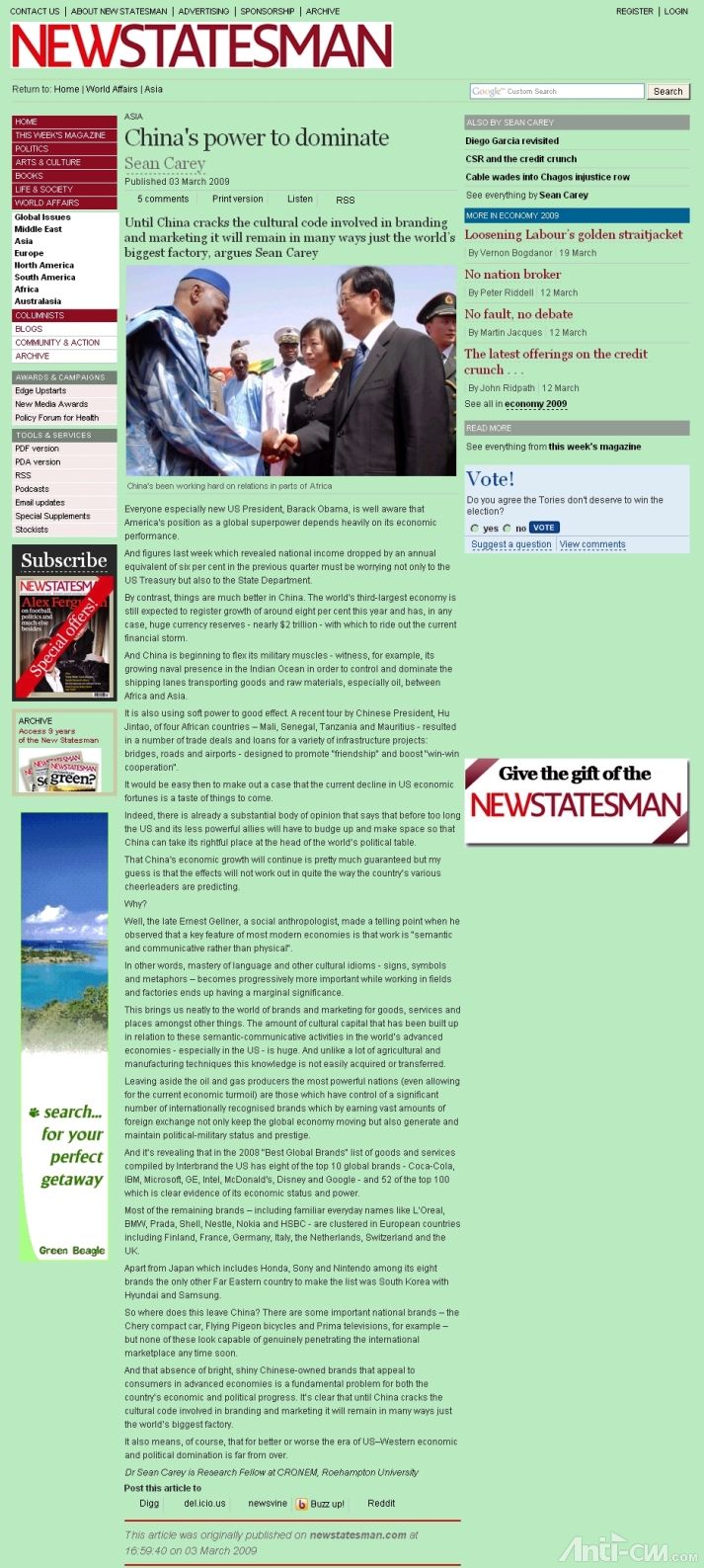【原文标题】China's power to dominate
【登载媒体】newstatesman.com
【来源地址】http://www.newstatesman.com/asia/2009/03/china-brands-world-economic
【译者】荡漾
【声明】本翻译供Anti-CNN使用,转载请注明译者及出处,谢谢!
【译文】

英国罗汉普顿大学国际种族与文化多样性研究中心(CRONEM)研究员Sean Carey博士认为中国在破译出品牌营销中的文化密码之前,在许多方面仍将停留在世界最大加工厂的定位上。
众所周知,尤其是美国总统奥巴马很清楚,美国的世界超级大国地位相当程度上仰赖于其经济成就。
上周公布的数据显示前一季度的国民收入下降了约年度的6%,这肯定令美国财政部和政府部门都焦虑不已。
中国正相反,情况好得多。作为世界第三大经济体的中国今年仍有望实现8%的经济增长;不管怎样,接近2万亿美元的巨额外汇储备有助于中国经受住当下的金融风暴。
同时中国开始展示其军事实力。例如为了控制和统治亚非之间尤以石油为主的商品、原材料等的运输航线,中国正增派印度洋上的海军力量。
而中国亦开始运用软实力以期获得良好的结果。中国主席胡锦涛近日出访非洲四国——马里、塞内加尔、坦桑尼亚和毛里求斯,签署了诸多贸易协议及桥梁、公路、机场等基建贷款项目,旨在促进“友谊”和促进“双赢合作”。
因此当前美国经济命运的衰落很容易令人从中闻出某种味道。
事实上已有许多人认为不久之后美国及其力量渐弱的盟国将不得不让出空间以使中国在世界政治舞台坐上应有的头排交椅。
中国经济将继续增长是相当有保证的。但在我看来事情未必会沿诸多唱盛中国的人们所预期的道路发展。
为什么呢?
已故社会人类学家Ernest Gellner经观察提出一个颇有力的观点称多数现代经济中起作用的关键特点在于重“语义、沟通胜于有形”的物质。
换言之,掌握语言及其他如符号、标识、隐喻等文化习惯用语对于各行业及工厂摆脱边际意义逐渐变得更加重要。
这就将我们带入一个融于商品、服务及环境其中的品牌营销的世界。世界发达经济体,尤其是美国对于这些语义-沟通活动的文化资本投入是巨大的。而且与许多农业和建筑技术不同,品牌影响的知识并不容易获取或转让。
不算原油/天然气生产国在内,那些最有实力的国家(即便考虑到当前的经济动荡)控制着诸多的国际知名品牌,赚取大量外汇,不仅推动全球经济发展,也增强与维持政治-军事地位及威望。
由Interbrand公布的2008年度商品与服务“全球最佳品牌”榜单上美国在前十中占有八席:可口可乐、IBM、微软、通用电气、英特尔、麦当劳、迪斯尼和Google,而100强中占据52个席位的事实清楚地证明了美国的经济地位和实力。
剩下来的大多数品牌,包括熟悉的日常品牌名字如欧莱雅、宝马、Prada、壳牌、雀巢、诺基亚和汇丰在内,都集中在芬兰、法国、德国、意大利、荷兰、瑞士和英国等欧洲国家。
榜单上除了如本田、索尼和任天堂等八个日本品牌外,来自远东国家的就是韩国的现代和三星。
中国在哪里?中国有一些重要的民族品牌,如奇瑞紧凑型车、飞鸽自行车和普瑞玛电视机。但看起来均无可能很快真正进入国际市场。
足以吸引发达经济体消费者的闪亮耀眼的中国自主品牌的缺失对中国的经济和政治发展是个根本问题。显然在中国破译出品牌营销中的文化密码之前,在许多方面仍将停留在世界最大加工厂的定位上。
当然这也意味着无论好坏,以美国主导的西方经济和政治统治还远未结束。
【原文】
Until China cracks the cultural code involved in branding and marketing it will remain in many ways just the world’s biggest factory, argues Sean Carey
Everyone especially new US President, Barack Obama, is well aware that America's position as a global superpower depends heavily on its economic performance.
And figures last week which revealed national income dropped by an annual equivalent of six per cent in the previous quarter must be worrying not only to the US Treasury but also to the State Department.
By contrast, things are much better in China. The world's third-largest economy is still expected to register growth of around eight per cent this year and has, in any case, huge currency reserves - nearly $2 trillion - with which to ride out the current financial storm.
And China is beginning to flex its military muscles - witness, for example, its growing naval presence in the Indian Ocean in order to control and dominate the shipping lanes transporting goods and raw materials, especially oil, between Africa and Asia.
It is also using soft power to good effect. A recent tour by Chinese President, Hu Jintao, of four African countries – Mali, Senegal, Tanzania and Mauritius - resulted in a number of trade deals and loans for a variety of infrastructure projects: bridges, roads and airports - designed to promote "friendship" and boost "win-win cooperation".
It would be easy then to make out a case that the current decline in US economic fortunes is a taste of things to come.
Indeed, there is already a substantial body of opinion that says that before too long the US and its less powerful allies will have to budge up and make space so that China can take its rightful place at the head of the world’s political table.
That China's economic growth will continue is pretty much guaranteed but my guess is that the effects will not work out in quite the way the country’s various cheerleaders are predicting.
Why?
Well, the late Ernest Gellner, a social anthropologist, made a telling point when he observed that a key feature of most modern economies is that work is "semantic and communicative rather than physical".
In other words, mastery of language and other cultural idioms - signs, symbols and metaphors – becomes progressively more important while working in fields and factories ends up having a marginal significance.
This brings us neatly to the world of brands and marketing for goods, services and places amongst other things. The amount of cultural capital that has been built up in relation to these semantic-communicative activities in the world’s advanced economies - especially in the US - is huge. And unlike a lot of agricultural and manufacturing techniques this knowledge is not easily acquired or transferred.
Leaving aside the oil and gas producers the most powerful nations (even allowing for the current economic turmoil) are those which have control of a significant number of internationally recognised brands which by earning vast amounts of foreign exchange not only keep the global economy moving but also generate and maintain political-military status and prestige.
And it’s revealing that in the 2008 "Best Global Brands" list of goods and services compiled by Interbrand the US has eight of the top 10 global brands - Coca-Cola, IBM, Microsoft, GE, Intel, McDonald's, Disney and Google - and 52 of the top 100 which is clear evidence of its economic status and power.
Most of the remaining brands – including familiar everyday names like L’Oreal, BMW, Prada, Shell, Nestle, Nokia and HSBC - are clustered in European countries including Finland, France, Germany, Italy, the Netherlands, Switzerland and the UK.
Apart from Japan which includes Honda, Sony and Nintendo among its eight brands the only other Far Eastern country to make the list was South Korea with Hyundai and Samsung.
So where does this leave China? There are some important national brands – the Chery compact car, Flying Pigeon bicycles and Prima televisions, for example – but none of these look capable of genuinely penetrating the international marketplace any time soon.
And that absence of bright, shiny Chinese-owned brands that appeal to consumers in advanced economies is a fundamental problem for both the country’s economic and political progress. It’s clear that until China cracks the cultural code involved in branding and marketing it will remain in many ways just the world’s biggest factory.
It also means, of course, that for better or worse the era of US–Western economic and political domination is far from over.
Dr Sean Carey is Research Fellow at CRONEM, Roehampton University
【截图】

|